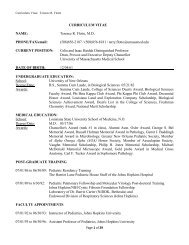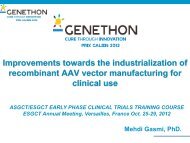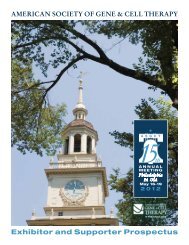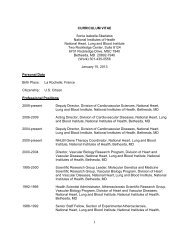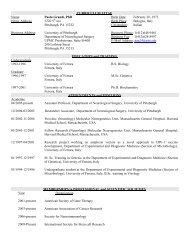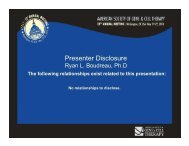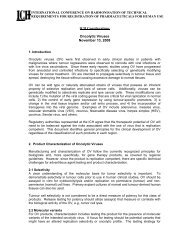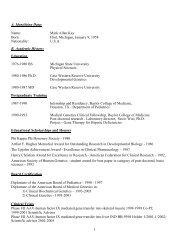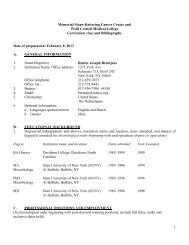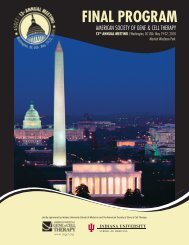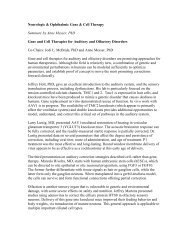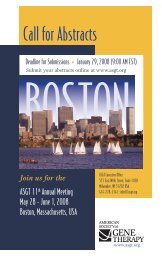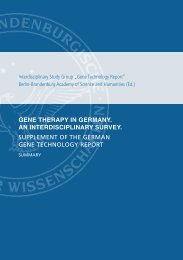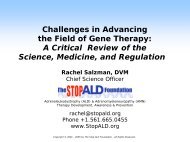FINAL PROGR AM - American Society of Gene & Cell Therapy
FINAL PROGR AM - American Society of Gene & Cell Therapy
FINAL PROGR AM - American Society of Gene & Cell Therapy
You also want an ePaper? Increase the reach of your titles
YUMPU automatically turns print PDFs into web optimized ePapers that Google loves.
20<br />
8th Annual Meeting • June 1 - 5, 2005 • St. Louis<br />
GENERAL MEETING INFORMATION<br />
<strong>AM</strong>ERICAN SOCIETY OF GENE<br />
THERAPY<br />
MISSION AND GOALS<br />
The <strong>American</strong> <strong>Society</strong> <strong>of</strong> <strong>Gene</strong> <strong>Therapy</strong> (ASGT) is a<br />
pr<strong>of</strong>essional non-pr<strong>of</strong>it medical and scientific<br />
organization dedicated to the understanding,<br />
development and application <strong>of</strong> gene and related cell and<br />
nucleic acid therapies and the promotion <strong>of</strong> pr<strong>of</strong>essional<br />
and public education in the field.<br />
ASGT is the largest medical pr<strong>of</strong>essional organization<br />
representing researchers and scientists dedicated to<br />
discovering new gene therapies. ASGT was established in<br />
1996, and has grown to close to 3,000 members from<br />
around the world. ASGT is committed to:<br />
· Promoting Research, Development and Application<br />
· Exchanging Information and Promote Education<br />
Among Pr<strong>of</strong>essionals and the Public<br />
· Promoting Development <strong>of</strong> Clinical Translations<br />
The ASGT 8th Annual Meeting will serve as a<br />
comprehensive forum to achieve these goals.<br />
NEEDS<br />
Clinical gene transfer has become more and more<br />
complex due to ongoing developments in the fields <strong>of</strong><br />
gene therapy itself, together with bioethics, research<br />
integrity, and financial conflicts, as well as new federal<br />
mandates, regulations and guidelines. Oligonucleotide<br />
Based Therapies, RNAi and Vaccine Therapies will also<br />
be discussed as well as many other topics. This meeting<br />
will provide an educational forum for scientists and<br />
clinicians to expand their knowledge about the broad<br />
developments in these fields.<br />
EDUCATIONAL OBJECTIVES<br />
At the conclusion <strong>of</strong> the activity, the participant should be<br />
able to:<br />
· Discuss key aspects <strong>of</strong> the current laboratory and/or<br />
clinical research in gene therapy.<br />
· Demonstrate knowledge <strong>of</strong> methods being used by<br />
gene therapy researchers and practitioners.<br />
· Describe one or more stimulating new areas <strong>of</strong><br />
inquiry in the area <strong>of</strong> gene therapy.<br />
· Demonstrate familiarity with federal regulations and<br />
guidelines for clinical gene transfer studies.<br />
EDUCATIONAL METHODS AND<br />
MATERIALS<br />
Lectures, Case Presentations, Panel Discussions,<br />
Question and Answer Sessions, Workshops, Audio/Video<br />
Presentations, Abstracts, Posters, Executive Summary.<br />
TARGET AUDIENCE<br />
The target audience includes basic science and<br />
translational researchers, clinical investigators, physicians,<br />
industry executives and scientists, postdoctoral fellows,<br />
graduate students, employees <strong>of</strong> federal government and<br />
regulatory agencies, and other healthcare pr<strong>of</strong>essionals<br />
with an interest in the latest advancements in the field <strong>of</strong><br />
gene therapy.<br />
EVALUATION METHOD<br />
Evaluation by questionnaire will address program<br />
content, presentation, and possible bias. Please take time<br />
to complete the evaluation forms distributed at each<br />
session you attend. Your input and comments are<br />
essential in planning future educational sessions. When<br />
completed, evaluations can be returned to the ushers<br />
assigned to your session or dropped in the evaluation<br />
collection boxes located throughout America’s Center.<br />
ACCREDITATION/CREDIT<br />
DESIGNATION<br />
This activity has been planned and implemented in<br />
accordance with the Essential Areas and policies <strong>of</strong> the<br />
Accreditation Council for Continuing Medical Education<br />
through the joint sponsorship <strong>of</strong> Stanford University<br />
School <strong>of</strong> Medicine and the <strong>American</strong> <strong>Society</strong> <strong>of</strong> <strong>Gene</strong><br />
<strong>Therapy</strong>. Stanford University School <strong>of</strong> Medicine is<br />
accredited by the ACCME to provide continuing medical<br />
education for physicians.<br />
Stanford University School <strong>of</strong> Medicine designates this<br />
educational activity for a maximum <strong>of</strong> 31 category 1<br />
credits toward the <strong>AM</strong>A Physician’s Recognition Award.<br />
Each physician should claim only those hours <strong>of</strong> credit<br />
that he/she actually spent in the activity.<br />
DISCLOSURE<br />
It is the policy <strong>of</strong> Stanford University that the provider<br />
and faculty/presenters disclose any significant financial or<br />
other relationships with commercial companies whose<br />
products may be discussed in the activity, or the<br />
commercial supporters, if any. Stanford University also<br />
requires that faculty disclose any unlabeled use or<br />
investigational use (not yet approved for any purpose) <strong>of</strong><br />
pharmaceutical and medical device products. Specific<br />
disclosure will be made to the participants prior to the<br />
educational activity.<br />
Faculty, topics, program schedule, and credit are subject<br />
to change.<br />
CME CERTIFICATES<br />
CME Certificates will be available at the CME desk for<br />
participants requiring CME credit for this meeting.



